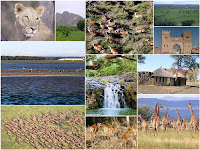The Culling of the Human Species
Some, like the British scientist James Lovelock - who formulated the Gaia theory, believe that the World is over populated and over crowded: "It is not simply too much carbon dioxide in the air . . . ," he writes in The Vanishing Face of Gaia,"......the root cause is too many people, their pets, and their livestock -- more than the Earth can carry. No voluntary human act can reduce our numbers fast enough even to slow climate change." He goes on in an interview with the New Scientist:
Mr. Lovelock's conclusions maybe shocking and completely unbelievable, but the question is: how long can Mankind and Earth continue this way? There is just too much destruction on our Planet; too much and too fast. It's very hard to imagine how Earth can continue sustaining us with the limited, fast depleting resources that we have, as many as we are - close to 7 billion now - for long, without some thing drastic happening. WWF and its periodic Living Planet Report - paints a similar very dire picture and future for Mankind:
There just isn't enough food, water and shelter for all of us, now; not to mention medical care, education, proper sewage treatment and waste disposal. It will get even worst with time and as we increase in numbers - we are increasing by about 75 million per year - the United Nations projects that the World population will be over 9 billion in 41 years. In Africa, the fastest growth is expected to be in: Uganda, the DR of Congo, Ethiopia and Nigeria. Will Africa, then, have enough resources to sustain all these people? If Africa, now, can't manage to feed, care for and shelter the 1 billion people it has - it's hard to imagine how it can manage to take care of an estimated, almost, 2 billion people in 2050.
Still: we can all take simple steps to reduce our impact on the planet. WWF’s online footprint calculator enables you to measure your footprint, and provides many tips on ways to reduce it. WWF also works to reverse the decline in the world’s most threatened species and habitats, and to tackle the global threat posed by climate change. And we can help bring about change LOCALLY, NATIONALLY AND INTERNATIONALLY. Or: support in whatever way you can, organizations like Wangari Mathaai's the Greenbelt Movement.
I'm an optimistic pessimist. I think it's wrong to assume we'll survive 2 °C of warming: there are already too many people on Earth. At 4 °C we could not survive with even one-tenth of our current population. The reason is we would not find enough food, unless we synthesised it. Because of this, the cull during this century is going to be huge, up to 90 per cent. The number of people remaining at the end of the century will probably be a billion or less. It has happened before: between the ice ages there were bottlenecks when there were only 2000 people left. It's happening again.
I don't think humans react fast enough or are clever enough to handle what's coming up. Kyoto was 11 years ago. Virtually nothing's been done except endless talk and meetings.
Mr. Lovelock's conclusions maybe shocking and completely unbelievable, but the question is: how long can Mankind and Earth continue this way? There is just too much destruction on our Planet; too much and too fast. It's very hard to imagine how Earth can continue sustaining us with the limited, fast depleting resources that we have, as many as we are - close to 7 billion now - for long, without some thing drastic happening. WWF and its periodic Living Planet Report - paints a similar very dire picture and future for Mankind:
Demand for resources now exceeds the planet's capacity to replenish its ‘natural capital’ by about 30%. If global consumption continues at the same rate, by the mid-2030s we will need the equivalent of two planets to maintain our lifestyles.
.........our rampant consumption of resources such as timber and paper, water, energy, agricultural crops, meat and dairy products, fish and seafood, and land for infrastructure – as well as the impacts associated with disposing of waste products.
“Our natural environment is already bowing under this pressure,” said Colin Butfield, WWF’s Head of Campaigns. “The danger is that the ecological recession will be followed by a widespread and irreversible breakdown in our most important natural systems.”
There just isn't enough food, water and shelter for all of us, now; not to mention medical care, education, proper sewage treatment and waste disposal. It will get even worst with time and as we increase in numbers - we are increasing by about 75 million per year - the United Nations projects that the World population will be over 9 billion in 41 years. In Africa, the fastest growth is expected to be in: Uganda, the DR of Congo, Ethiopia and Nigeria. Will Africa, then, have enough resources to sustain all these people? If Africa, now, can't manage to feed, care for and shelter the 1 billion people it has - it's hard to imagine how it can manage to take care of an estimated, almost, 2 billion people in 2050.
Still: we can all take simple steps to reduce our impact on the planet. WWF’s online footprint calculator enables you to measure your footprint, and provides many tips on ways to reduce it. WWF also works to reverse the decline in the world’s most threatened species and habitats, and to tackle the global threat posed by climate change. And we can help bring about change LOCALLY, NATIONALLY AND INTERNATIONALLY. Or: support in whatever way you can, organizations like Wangari Mathaai's the Greenbelt Movement.


